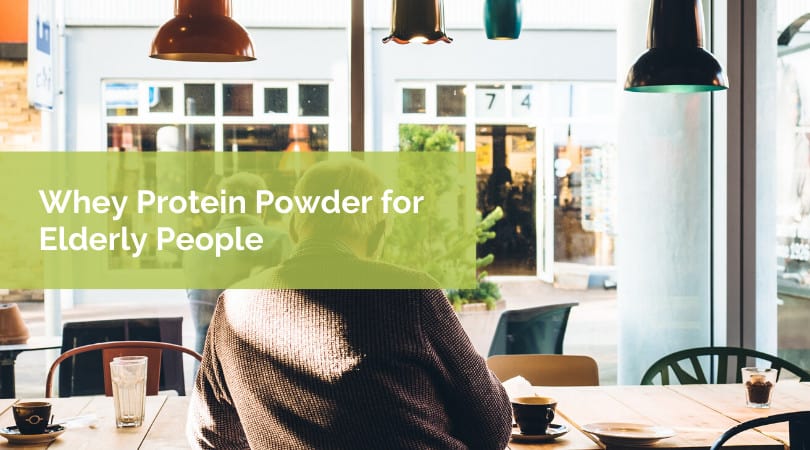
The high-quality protein found in whey is not just ideal for bodybuilders or athletes. Protein supplements for elderly people may have even more of a beneficial effect. Age-related muscle loss can significantly impact someone’s life and ability to perform even the simplest daily tasks. Whey protein shakes for the elderly may help offset some of the natural loss of muscle that occurs as we get older, helping one to age gracefully and stay active throughout life.
Protein and Aging
Older adults are at risk for a condition called sarcopenia or muscle loss, especially if they get sick. This is because the weakness and recovery process can lead to inactivity and decreased food intake, which can lead to muscle loss and more inactivity as a result. But muscle loss is not just a problem for older adults. After the age of 30, inactive people lose about 3-5% of their skeletal muscle each decade. If you remain active throughout life, you can slow the progression of muscle loss but you will still lose some muscle as you age.
By the time you reach your 70s or 80s, the gradual muscle loss can really add up. Lack of muscle causes your metabolism to slow down, putting you at risk for weight gain even if you don’t change your diet. Losing muscle makes simple daily activities challenging, like climbing the stairs or even running errands to the store. It may also increase the risk of bone fractures since there is no muscle to support the bones.
A 2017 study evaluated the impact of drinking a whey protein powder for elderly subjects. The researchers found that the protein shakes for elderly people were able to increase their muscle strength even without physical activity. Those that just received the protein shakes gained about 700 grams of muscle during the study period. Subjects who drank the shakes and exercised ended up gaining even more muscle mass, strength and stamina.
Including more protein in your diet as you age will help support the lean body mass you do have, slow down muscle loss and ultimately help you stay active.
Best Protein Drink for Elderly People
Many protein shakes for elderly people do not contain enough protein or the right type of protein to make a significant difference in muscle mass. Most commercial bottled protein drinks contain only around 9-10 grams and are usually a blend of soy and milk.
A 2018 study compared the impact of whey protein versus other types of protein on the muscle mass of older adults age 65 to 80 years old. During the study period, subjects were told to restrict their daily steps to 750 per day and reduce their calories by 500 per day, in an attempt to mimic what an elderly person might experience while hospitalized. The low-calorie intake and reduced activity levels that occur during hospitalization tend to worsen sarcopenia. This was followed by a one-week “recovery” period where subjects ate normally and continued their supplements.
During the low-calorie period, all of the subjects lost the same amount of muscle mass. But during the recovery period, the whey protein group recovered much faster.
The results of this study are likely related to the leucine content of whey protein, an important branched-chain amino acid that helps stimulate new muscle. Other common proteins, like collagen or many plant-based proteins, are low in leucine or missing other critical amino acids.
How to Use Protein Powder for Elderly People
Protein supplements for elderly people can be a great addition to a healthy diet. The body becomes less responsive to protein as you age, so the elderly need a higher dose to stimulate muscle mass.
If you are looking for the best protein drink for elderly people, aim for 30 grams of protein per serving. To support lean muscle mass and prevent any muscle loss, the most important aspects to consider are the number of grams in the product and the quality of the protein supplement. A product made with whey protein is the gold standard when it comes to providing a highly absorbable and complete protein that is high in the essential amino acids.
If you are an older adult, always speak to your doctor before using protein supplements.
Protein shakes for elderly people are one way to meet protein needs as you get older, but the diet should also include foods high in protein as well. A combination of protein sources and the use of supplements will help you stay active into older age and keep those muscles well maintained.
- Persistent Tiredness and Chronic Fatigue: Causes and Symptoms - February 27, 2024
- Can A Protein Shake Replace A Breakfast Meal? - March 2, 2023
- Glutamine After Surgery: Does It Help With Recovery? - February 17, 2023





